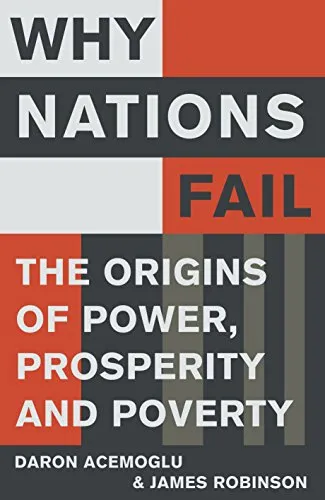Why Nations Fail: The Origins of Power, Prosperity, and Poverty (PowerPoint Presentation Delivered for Morishima Lecture, LSE June 8, 2011)
4.5
Reviews from our users

You Can Ask your questions from this book's AI after Login
Each download or ask from book AI costs 2 points. To earn more free points, please visit the Points Guide Page and complete some valuable actions.Related Refrences:
'Why Nations Fail: The Origins of Power, Prosperity, and Poverty' offers a compelling analysis of the factors that contribute to the success or failure of nations. Authored by economists Daron Acemoglu and James Robinson, this book delves into the enigmatic question of why some countries achieve economic prosperity while others languish in poverty. Presented as a PowerPoint for Morishima Lecture at the LSE, the book dissects the historical, political, and economic dynamics that shape the paths of nations.
Detailed Summary of the Book
Acemoglu and Robinson argue against orthodox economic theories that emphasize geography, culture, or ignorance as primary causes for economic disparity. Instead, they introduce the concept of institutional structures as central drivers of national success. The authors categorize these into two types: inclusive and extractive institutions. Inclusive institutions encourage participation, innovation, and economic activity by providing a level playing field for all. This ensures that the majorities have access to education, technology, and political power, fostering sustainable development. On the other hand, extractive institutions concentrate power and opportunities in the hands of a few, often leading to stagnation and degeneration.
Through a historical lens, the book examines numerous case studies to illustrate these concepts. The authors explore why several countries in Latin America remain mired in poverty while North America has thrived. Their detailed analysis spans centuries and continents, as it weaves together the stories of empires, revolutions, and pivotal economic changes, illuminating how the institutional legacy of colonialism, revolutions, and reforms affects the current prosperity of nations.
Key Takeaways
- Inclusive political and economic institutions foster sustained economic growth and prosperity.
- Extractive institutions, where power is concentrated and the majority is excluded, lead to stagnation and poverty.
- Historical events and critical junctures can lead nations onto different paths of development.
- Understanding a country's political dynamics and historical context is crucial in addressing its economic challenges.
- Efforts to reform institutions must focus on making them more inclusive to ensure long-term prosperity.
Famous Quotes from the Book
“Nations fail today because their extractive economic institutions do not create the incentives needed for people to save, invest, and innovate.”
“Economic institutions shape economic incentives: the incentives to become educated, to save and invest, to innovate and adopt new technologies.”
“Inclusive economic institutions require secure property rights and economic opportunities not just for the elite but for a broad cross-section of society.”
Why This Book Matters
'Why Nations Fail' is a monumental work that reshapes our understanding of economic and political development. It provides a robust framework to analyze the root causes of wealth and poverty in countries worldwide. Its insights are not only theoretically groundbreaking but also critically applicable to policymakers, economists, and leaders aiming to pave a path toward sustainable development and prosperity. In a globalized world that is increasingly interconnected, understanding the underpinnings of economic success or failure is essential for tackling the pressing issues of inequality and underdevelopment. The book's focus on institutions shifts the conversation from deterministic theories to an adaptable and actionable understanding of development.
Free Direct Download
You Can Download this book after Login
Accessing books through legal platforms and public libraries not only supports the rights of authors and publishers but also contributes to the sustainability of reading culture. Before downloading, please take a moment to consider these options.
Find this book on other platforms:
WorldCat helps you find books in libraries worldwide.
See ratings, reviews, and discussions on Goodreads.
Find and buy rare or used books on AbeBooks.
1447
بازدید4.5
امتیاز0
نظر98%
رضایتReviews:
4.5
Based on 0 users review
Questions & Answers
Ask questions about this book or help others by answering
No questions yet. Be the first to ask!







